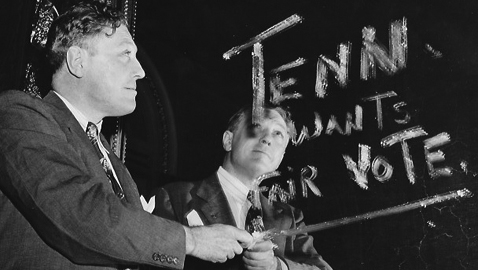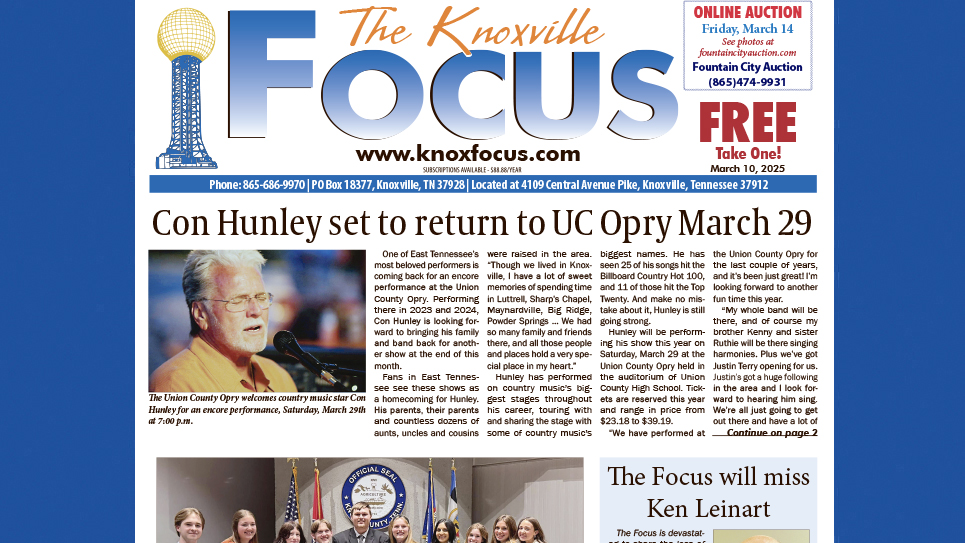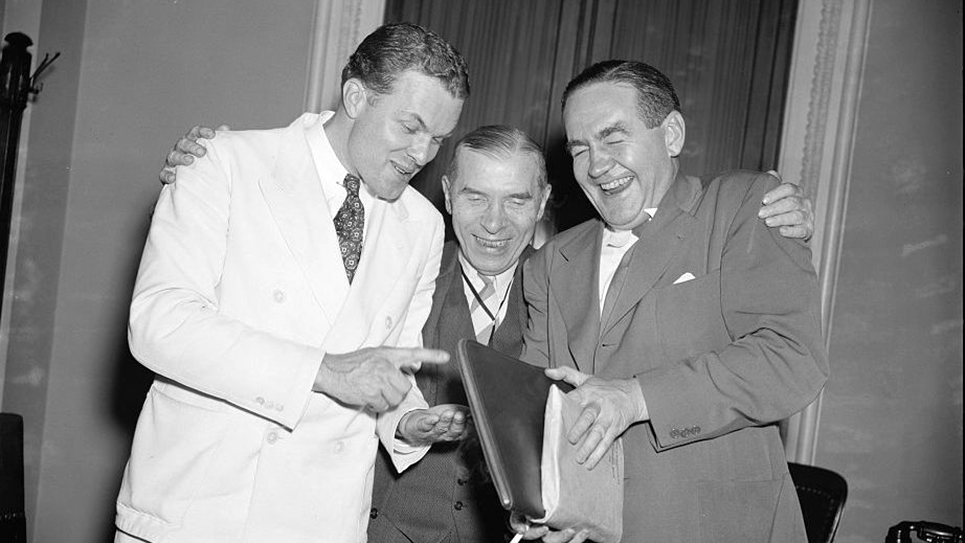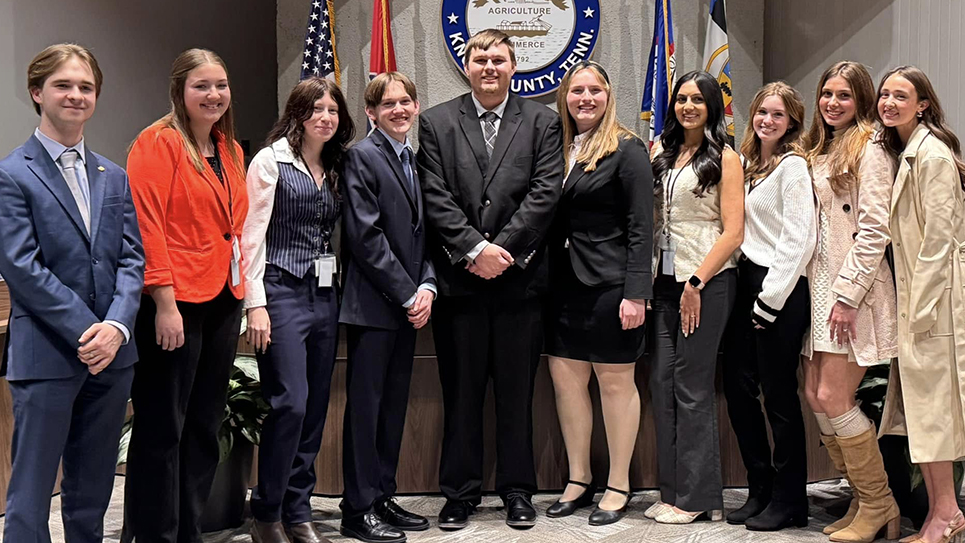By Ray Hill
W. “Ned” Carmack’s campaign for the United States Senate ended on a dusty road in rural West Tennessee under circumstances never resolved. Carmack’s wife Charlotte arrived to whisk him home to Murfreesboro, where Carmack spent some time in a hospital. Found unconscious, beaten, bloodied and partially paralyzed, Ned Carmack was forced to withdraw from the 1938 senatorial contest.
Little was heard from Ned Carmack until May of 1942 when he entered the senatorial primary yet again; this time Carmack proposed to challenge Senator Tom Stewart, the victor of the 1938 special election. Stewart was the favorite and once again had the backing of senior senator K. D. McKellar and Memphis Boss E. H. Crump. Carmack announced he was running for the Democratic nomination for U. S. Senate on May 31, 1942.
Ned Carmack was quick to get on the campaign trail and charged Senator Stewart with “hogging patronage” in Dyersburg, Tennessee. Considering Stewart’s senior colleague, Kenneth McKellar, had a national reputation for wringing patronage out of just about anything, the idea Tom Stewart could “hog” patronage was somewhat amusing. Ned Carmack made the most of his late father’s legacy by opening his campaign headquarters in Nashville’s Tulane Hotel. Carmack’s father had opened headquarters in the Tulane when he was successfully elected to the United States Senate in 1900.
Ned Carmack was soon hitting his stride as a candidate, lashing Tom Stewart for having placed one of his sons on his Senate payroll, assailing Stewart for having backed a congressional reform bill that provided congressmen and senators a pension system, and generally for having been a “me too” senator to McKellar.
Carmack was a more formidable challenger in 1942 if for no other reason than he had the all out support of the Nashville Tennessean. Silliman Evans, publisher of the Tennessean, had broken with Governor Prentice Cooper over the question of the poll tax and was strongly supporting former congressman J. Ridley Mitchell against Cooper. Evans might well have backed Mitchell and Carmack out of principle, but it was also quite true he wished to be the power in Tennessee politics. The Tennessean lavishly covered the campaigns of Ridley Mitchell and Ned Carmack, while at the same time hitting Prentice Cooper and Tom Stewart hard. While bitterly attacking Tom Stewart, Ned Carmack dramatically told audiences he realized he was a victim of “slander” while the senator remained in Washington. “They are saying, I am told,” Carmack complained, “that I am running on my father’s name. I know that, and am proud that my father’s name has endured for more than 30 years. He has been my ideal in all things in life.” “The greatest thing he left me,” Carmack cried, “was an honored name. I have never sold that name for patronage nor for favor.”
As the primary campaign drew to a close, both Governor Cooper and Senator Stewart were hard pressed by the opposition. The United States was in the middle of a global war and the war was not going well for the allies. The frustrations felt by many Americans was evident in the midterm elections, which was hard on incumbents. Both Cooper and Stewart ran well in East Tennessee where Senator McKellar was popular. All of the candidates were from Middle Tennessee and Senator Stewart easily beat Carmack in his native Franklin County, but Governor Cooper was soundly beaten in his own Bedford County by Ridley Mitchell. Both Senator Stewart and Governor Cooper were losing the same counties to their opponents. Cooper and Stewart carried three of Tennessee’s large urban counties: Hamilton, Knox and Shelby and both lost Davidson County decisively. Ned Carmack won Davidson County (Nashville) 9,214 to Stewart’s 3,077. Ridley Mitchell won Davidson County 14,236 to 5,899 votes for Prentice Cooper. Yet for once, it was Shelby County that made the difference, especially in the Senate race. Cooper won 47,186 votes to 2,749 for Ridley Mitchell. Senator Stewart won Shelby County with 42,875 votes to 6,959 votes for E. W. Carmack, Jr. The margins were similar for Cooper and Stewart in Shelby County where E. H. Crump held sway to that of Davidson County where Silliman Evans’s Tennessean dominated news coverage. Tom Stewart edged out Ned Carmack for the Democratic nomination for the United States Senate by barely 20,000 votes. More people voted in the gubernatorial contest where Prentice Cooper won by less than 50,000 votes.
The 1942 race for the U. S. Senate would be the peak of Ned Carmack’s political career, although it was not the end of his attempts to win public office. For the rest of his life, E. W. Carmack, Jr. would bitterly insist he had been cheated out of the Democratic nomination and election to the United States Senate.
In 1943 Carmack bought a mansion on Main Street in Murfreesboro that would be his home until the end of his life. It was a lovely structure that still stands today. The next year, Carmack had his eye on the governorship. Prentice Cooper was not eligible to seek reelection in 1944 and Congressman Jim Nance McCord was running with the support of Senator McKellar and Crump, but Carmack announced, “I think it probable, now, that I shall become a candidate.” Carmack felt there were two “questions” the voters needed to ponder before he would consent to become a candidate for governor, neither of which were within the purview of Tennessee’s chief executive. Ned Carmack wondered if the Tennessee Valley Authority should not have “a proven friend in the powerful gubernatorial office?” The second issue was the “intolerable condition of the liquor traffic in wet centers?”
While flirting with a run for governor, E. W. Carmack, Jr. was attempting to move heaven and earth to be accepted into a branch, any branch, of the armed services. Carmack haunted the corridors of Senator K. D. McKellar’s Washington office, seeking the help of the powerful McKellar. Although McKellar wrote numerous letters and made calls on behalf of Ned Carmack, no commission was forthcoming for Ned Carmack. Close to fifty years old and crippled, Ned Carmack was not a bright prospect for service during World War II, yet another disappointment that left Carmack bitter. The notion of a Carmack gubernatorial campaign never seemed to catch on and before the state filing deadline, another petition qualifying Carmack to run for the Tennessee Utilities Commission was presented to the Secretary of State. Eventually, Ned Carmack withdrew as a candidate for the Utilities Commission against a weak incumbent who had been appointed to office by Governor Cooper recently. In some counties, Carmack’s name remained on the ballot and he carried more than a few of them. It was readily apparent Ned Carmack almost surely would have been elected to the Tennessee Utilities Commission without much trouble had he merely left his name on the ballot. Another political possibility for Carmack was seeking the Democratic nomination for Congress from the Fourth District as incumbent Jim McCord was running for governor. When queried about the possibility, Carmack, according to the Tennessean, replied with “only a broad smile and a quizzical look out of very shrewd political eyes.” Doubtless the reporter was being kind as Carmack likely had no clue as to what he intended to do, especially as he seemed more interested in hinting that he would run for governor after all.
Just weeks before the Democratic primary, Carmack announced he was not a candidate for any office, as he had received information he was being called to Washington for yet another examination in his effort to win a commission in some branch of the armed services. Ned Carmack frittered away probably his best chance of being elected to public office. One could make a compelling case that Carmack would have been a formidable candidate for the gubernatorial nomination and almost certainly would have been elected to the Utilities Commission. Likewise, it seems probable Ned Carmack could have won the Democratic nomination for Jim McCord’s open congressional seat. Instead, Ned Carmack thought there was a chance, slender though it might be, for him to serve as part of the military government in the South Pacific.
His desire to serve in the military during World War II dashed, Ned Carmack’s mind once again turned to politics in 1945. By the end of the year, Carmack was saying while he had received calls and letters from Tennesseans urging him to run for governor in 1946, he had given the idea scant thought and felt any discussion would be premature.
Ned Carmack embarked on his last campaign for public office by challenging Senator Kenneth D. McKellar. McKellar had been the attorney for Ned Carmack’s father when the elder Carmack’s election to the U. S. House of Representatives had been challenged by the incumbent. McKellar had supported Ned Carmack’s mother to be Postmistress of the Columbia post office and had tried to help him get into the military. Apparently gratitude extended only so far and Carmack once again had the all out support of the Tennessean. While waging a lively campaign, Carmack did not find the seventy-seven year old McKellar as vulnerable as Tom Stewart. McKellar was entrenched and most Tennesseans were grateful to the senator for his help. Aging and frequently ill, McKellar never came back to Tennessee to campaign while Ned Carmack crisscrossed the state. Opponents of the McKellar – Crump combine were surprised when the senator won easily, defeating Carmack with better than 60% of the vote. Never again was Edward Ward Carmack, Jr. a factor in Tennessee politics.
Even more bitter after his loss to McKellar, Ned Carmack contented himself by filing a series of $50,000 law suits against political opponents whom he believed had questioned his patriotism. Carmack maintained that the opposition had cost him many votes in his 1946 campaign. Carmack spoke on behalf of Congressman Estes Kefauver’s bid for the U. S. Senate against incumbent Tom Stewart in 1948. While speaking to a “small, but enthusiastic crowd” in Gallatin, Tennessee, Ned Carmack launched into a fierce attack on E. H. Crump, describing the Memphis Boss as “the Hitler of Tennessee.” Carmack was once again on the fringe of the campaign when he claimed former Secretary of State Cordell Hull had commended Kefauver after the congressman had written Hull about his forthcoming autobiography. Hull had made reference to Kefauver’s “splendid progress in congress”, but it didn’t amount to the sort of endorsement Carmack tried to make it during the primary campaign.
W Carmack, Jr. could take some solace perhaps in the defeat of Senator Tom Stewart in 1948, as well as that of Senator K. D. McKellar in 1952. The rise of Estes Kefauver and Albert Gore owed something to the candidacies of Ned Carmack, but Carmack was no longer a legitimate candidate for much of anything. Carmack had put politics behind him as he claimed to have borrowed money to invest in the Stone River Homes project, which surrounded a military installation near Smyrna, Tennessee. Stone River Homes was intent upon building housing for military families in the area. Carmack joined attorney Jordan Stokes, III and his brother-in-law Joe Hart in attempting to develop a $3 million uranium plant in “the Black Hills territory. Carmack was described as one of the principal stockholders, but the corporation never amounted to much. According to one of Carmack’s close associates, Carmack had been a teetotaler until around 1952 when he began to drink. By 1958, Ned Carmack seemed to be “dependent” upon alcohol.
Ned Carmack continued to live in his mansion on Main Street in Murfreesboro, more and more isolated from the rest of the world. Carmack’s wife Charlotte died in 1968 and he saw fewer and fewer friends. E. W. Carmack, Jr. died alone inside his mansion on September 18, 1972. The Tennessean ran an editorial noting Carmack’s death and his passing was overshadowed by his father’s reputation, just as his life had been. The Tennessean was hard pressed to find some significant achievement to praise in Ned Carmack’s passing away. Unable to do so, the Tennessean contented itself with noting Ned Carmack’s “long and colorful career that embraced the fields of law, journalism, politics and real estate development.” E. W. Carmack, Jr. had not really made a success in any field and Jim Summerville, author of The Carmack – Cooper Shooting, wrote that Ned “never found his purpose in life…found no place in the world.”
It was a conclusion as sad as it was true for Ned Carmack.







